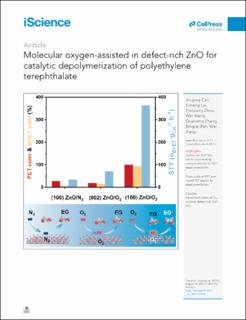Molecular oxygen-assisted in defect-rich ZnO for catalytic depolymerization of polyethylene terephthalate
Journal article, Peer reviewed
Published version

Åpne
Permanent lenke
https://hdl.handle.net/11250/3100084Utgivelsesdato
2023Metadata
Vis full innførselSamlinger
- Department of Chemistry [433]
- Registrations from Cristin [9791]
Sammendrag
Polyethylene terephthalate (PET) is the most produced polyester plastic; its waste has a disruptive impact on the environment and ecosystem. Here, we report a catalytic depolymerization of PET into bis(2-hydroxyethyl) terephthalate (BHET) using molecule oxygen (O2)−assisted in defect-rich ZnO. At air, the PET conversion rate, the BHET yield, and the space-time yield are 3.5, 10.6, and 10.6 times higher than those in nitrogen, respectively. Combining structural characterization with the results of DFT calculations, we conclude that the (100) facet of defect-rich ZnO nanosheets conducive to the formation of reactive oxygen species (∗O2−) and Zn defect, promotes the PET breakage of the ester bond and thus complete the depolymerization processed. This approach demonstrates a sustainable route for PET depolymerization by molecule-assisted defect engineering.
